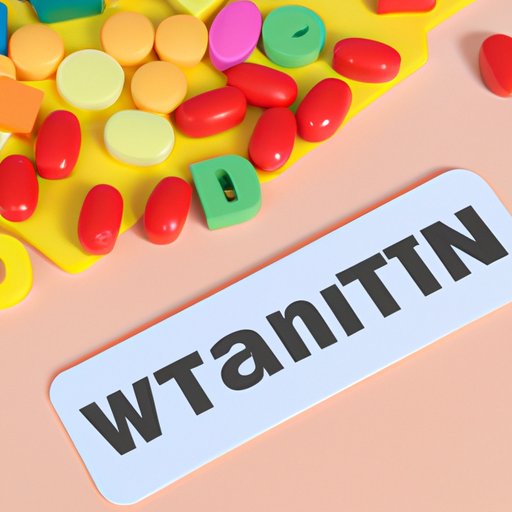
I. Introduction
Vitamin D, often referred to as the sunshine vitamin, is an essential nutrient for the human body. It plays an important role in maintaining bone health while also supporting the immune system and reducing the risk of chronic illnesses. While getting enough Vitamin D is crucial, many people wonder if they can take too much Vitamin D, leading to negative health consequences.
II. Overview of Vitamin D
Vitamin D is a fat-soluble vitamin that is produced by the body when the skin is exposed to sunlight. It can also be obtained through certain dietary sources such as fatty fish, mushrooms, and fortified foods. Vitamin D helps the body to absorb calcium, which is essential for building and maintaining healthy bones. The recommended daily intake for Vitamin D is 600-800 IU (international units) for adults and children over the age of 1. However, taking more than the recommended amount can lead to negative health consequences.
III. The Risks of Overdosing on Vitamin D and its Impact on the Body
Taking too much Vitamin D can cause an excess of calcium to build up in the blood, known as hypercalcemia. This can lead to symptoms such as nausea, vomiting, constipation, weakness, and frequent urination. In severe cases, hypercalcemia can cause kidney stones and damage to the kidneys, and may also lead to bone pain and muscle weakness. Overdosing on Vitamin D can also cause damage to the heart and blood vessels.
IV. Symptoms and Signs of Overdosing on Vitamin D
If an individual is overdosing on Vitamin D, they may experience symptoms such as abdominal pain, weight loss, fatigue, and weakness. Mental symptoms may include confusion, irritability, and depression. It is important to note that these symptoms may not be visible until a significant amount of time has passed after the overdose.
V. Long-term Effects of Overdosing on Vitamin D and Preventive Measures
Long-term effects of overdosing on Vitamin D can include the aforementioned problems such as kidney damage and heart issues, as well as the increased risk of developing kidney stones and osteoporosis. To prevent overdosing, individuals should follow the recommended daily intake and should avoid taking high doses of Vitamin D supplements unless advised to do so by a healthcare professional.
VI. The Adequate Intake Amount of Vitamin D and How to Meet Daily Requirement
The recommended intake of Vitamin D can be obtained through a combination of exposure to sunlight and through certain dietary sources such as fatty fish, eggs, and fortified foods such as cereal, milk, and yogurt. For individuals who are not able to get enough Vitamin D through their diets and sunlight exposure, supplements can be taken. It is important to talk to a healthcare provider before taking Vitamin D supplements.
VII. The Role of Medical Professionals in Advising on Vitamin D Intake and Supplementation
Healthcare providers play an important role in advising patients about their Vitamin D intake. Individuals with a history of kidney problems or those taking medication that affects Vitamin D absorption should talk to their healthcare provider about appropriate Vitamin D intake. Moreover, healthcare providers can address the specific needs of an individual in relation to their age, health status, lifestyle, and geographical location, which all play important roles in their Vitamin D needs.
VIII. Conclusion
Vitamin D intake is essential for overall health, but taking too much can lead to negative health consequences. Individuals should follow the recommended daily intake and consult with a healthcare provider if they are having difficulty getting enough Vitamin D through their diet and sunlight exposure. By following these guidelines, individuals can maintain optimal overall health and support bone and immune system health throughout their lifetime.





